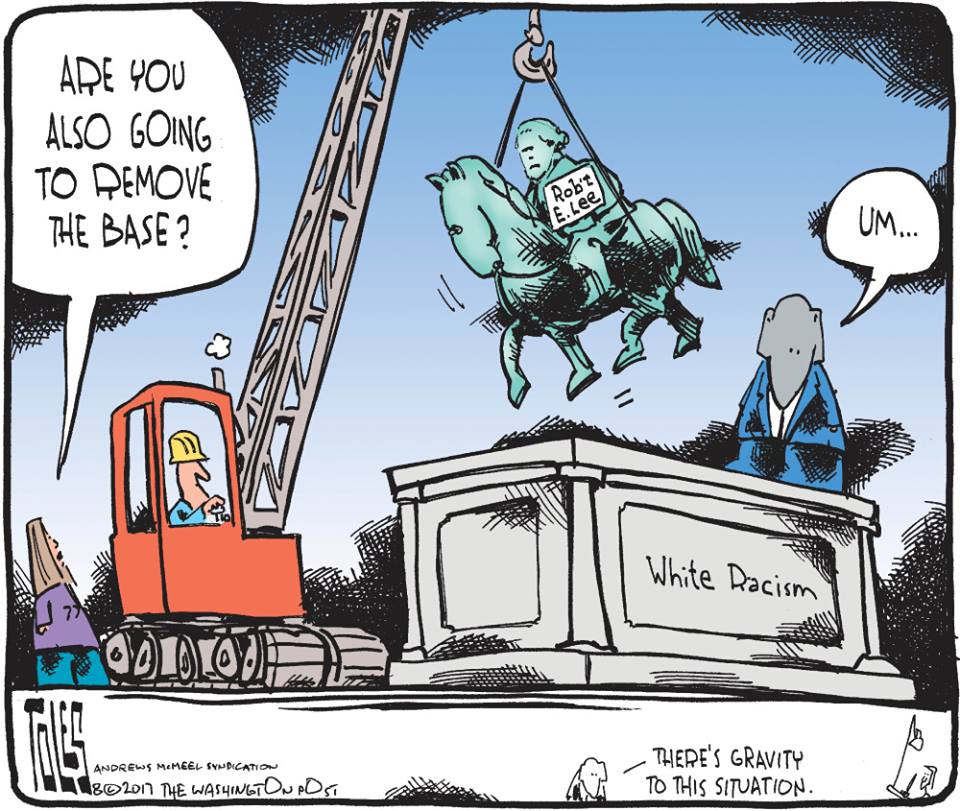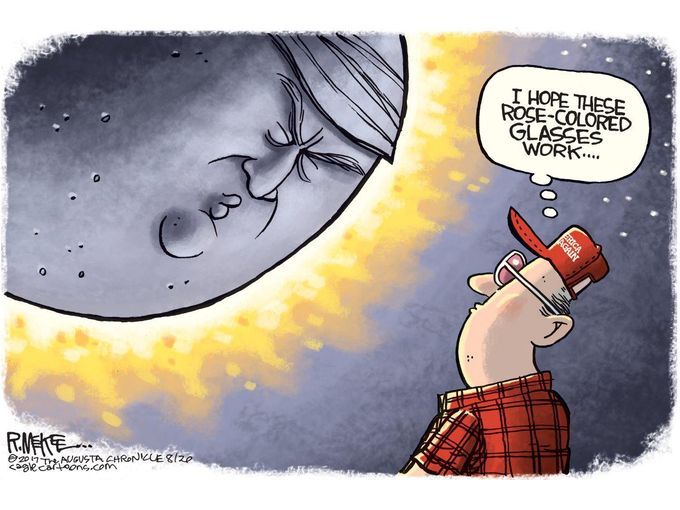The Daily Escape:

Luecantha by Philip Grausman, at Grounds for Sculpture, New Jersey – photo by Wrongo
Wrongo and Ms. Right have been away, including visiting the Grounds for Sculpture. While we were on the road, Der Trump spoke at a “Trump for President” rally in Phoenix, where he committed to pardoning former Sheriff Joe Arpaio. You remember Joe Arpaio, the guy that defied a court order to stop racially profiling Latinos, the guy who was found guilty of contempt of court when he wouldn’t stop the profiling? What would it mean to pardon Arpaio? It would once again show that Trump doesn’t respect judges, or the law.
He also promised to cause a government shutdown if Congress didn’t fund the cost of his border wall. Wasn’t Mexico supposed to be paying for that?
Most disturbing, Trump told his supporters that people are trying to take away “our culture”: (brackets by the Wrongologist)
They’re trying to take away our culture. They’re trying to take away our history. And our weak leaders do it overnight. These things [statues] have been here for 150 years, for 100 years. You go back to a university and it’s gone. Weak, weak people.
Whatever could Trump mean when he speaks about “our culture”? He’s aligned himself with America’s neo-Confederates. He wasn’t talking to the entire nation, he was talking to the Phoenix crowd and to his supporters around the country. If there was any doubt that Trump was staking a claim for neo-confederates and white nationalists, consider his conclusion:
We are Americans and the future belongs to us. The future belongs to all of you. This is our moment. This is our chance. This is our opportunity to recapture our dynasty like never before.
From Booman:
The “Americans” he is talking about are not all Americans, and what dynasty could he be referring to? It isn’t a Democratic or Republican dynasty. It’s an uninterrupted record of unquestioned white supremacy that was disrupted and can only now be “recaptured.”
Is this just a political stance, or does he truly believe what he says? Hard to know. What is unambiguous is that he’s now leading a neo-Confederate movement that sees white nationalists and white supremacists as “good American people”. What is now clear is that Trump is speaking only to the white Americans whose forebears founded this country.
Who should remake the country, you know, and make it great again? He’s talking to his base, which includes White Supremacists, White Nationalists, the militias, the Klan and the American Nazis. They are the ones he says should remake this country, not that it was all that great 150 years ago.
Think this is wrong? He’s tripled down on including these groups as part of his base since his gaffe at Charlottesville, so now we have to believe that he really means it.
From the New Yorker’s David Remnik: (parenthesis and brackets by the Wrongologist)
During his speech in Charlotte (before the election in November 2016)… [President]Obama warned that no one really changes in the Presidency; rather, the office “magnifies” who you already are. So if you “accept the support of Klan sympathizers before you’re President, or you’re kind of slow in disowning it, saying, ‘Well, I don’t know,’ then that’s how you’ll be as President.”
Somebody was smart enough to know what would happen if Trump was elected.
Trump is willing to leave identity groups like people of color, feminists, minority religions like the Jews, and the LGBTQ, to the Democrats. In TrumpWorld, they bring you the fake news. They brought you the trade agreements that took your jobs away. They let Mexicans and Muslims into your country.
In Phoenix, he called journalists “sick people.” He accused the news media of “trying to take away our history and our heritage”. He questioned the media’s patriotism:
I really think they don’t like our country…I really believe that. And I don’t believe they’re going to change..
Trump isn’t worried about his lies. Its the MSM who are liars, and their stories are all fake. When Trump delegitimizes the news and media organizations, it is every citizen’s duty to resist.
Control the media, control the people.
The last word goes to Booman:
So, like in the Civil War…and the Civil Rights Era, it’s time for Americans to do battle. This time, our own president is the enemy
You need help getting the truth out, and so does Wrongo. For inspiration, let’s listen to the Beatles song “Help!” from the album and film of the same name. “Help!” was number 1 on both the UK and US singles charts in late summer 1965. John Lennon always said that it should have been played at a slower tempo, so here is “Help!” covered by Deep Purple, live in Denmark in 1968:



















